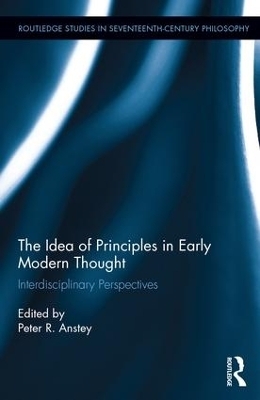
The Idea of Principles in Early Modern Thought
Routledge (Verlag)
978-1-138-21158-2 (ISBN)
Ranging from mathematics and law to chemistry, from natural and moral philosophy to natural theology, and covering some of the leading thinkers of the period, this volume presents ten compelling new essays that illustrate the centrality and importance of the idea of principles in early modern thought. It contains chapters by leading scholars in the field, including the Leibniz scholar Daniel Garber and the historian of chemistry William R. Newman, as well as exciting, emerging scholars, such as the Newton scholar Kirsten Walsh and a leading expert on experimental philosophy, Alberto Vanzo. The Idea of Principles in Early Modern Thought: Interdisciplinary Perspectives charts the terrain of one of the period’s central concepts for the first time, and opens up new lines for further research.
Peter R. Anstey is Professor of Philosophy at the University of Sydney. He specializes in early modern philosophy with a particular focus on the philosophy of John Locke, experimental philosophy, and the philosophy of principles. He is the author of John Locke and Natural Philosophy (2011) and editor of The Oxford Handbook of British Philosophy in the Seventeenth Century (2013).
Introduction
Peter R. Anstey
1. Early Modern Mathematical Principles and Symmetry Arguments
James Franklin
2. The Development of Principles in Equity in the Seventeenth Century
Joe Campbell
3. Alchemical and Chymical Principles: Four Different Traditions
William R. Newman
4. The Two Comets of 1664–1665: A Dispersive Prism for French Natural Philosophical Principles
Sophie Roux
5. Corpuscularism and Experimental Philosophy in Domenico Guglielmini’s Reflections on Salts
Alberto Vanzo
6. The Principles of Spinoza’s Philosophy
Michael LeBuffe
7. Principles in Newton’s Natural Philosophy
Kirsten Walsh
8. Leibniz on Principles in Natural Philosophy: The Principle of the Equality of Cause and Effect
Daniel Garber
9. Experimental Philosophy and the Principles of Natural Religion in England, 1667–1720
Peter R. Anstey
10. A Conflict of Principles: Grotius’ Justice versus Hume’s Utility
Kiyoshi Shimokawa
| Erscheinungsdatum | 28.05.2017 |
|---|---|
| Reihe/Serie | Routledge Studies in Seventeenth-Century Philosophy |
| Zusatzinfo | 18 Line drawings, black and white; 3 Halftones, black and white; 21 Illustrations, black and white |
| Verlagsort | London |
| Sprache | englisch |
| Maße | 152 x 229 mm |
| Gewicht | 566 g |
| Themenwelt | Geschichte ► Allgemeine Geschichte ► Neuzeit (bis 1918) |
| Geisteswissenschaften ► Philosophie ► Logik | |
| Geisteswissenschaften ► Philosophie ► Philosophie der Neuzeit | |
| Mathematik / Informatik ► Mathematik | |
| Naturwissenschaften | |
| Sozialwissenschaften | |
| ISBN-10 | 1-138-21158-3 / 1138211583 |
| ISBN-13 | 978-1-138-21158-2 / 9781138211582 |
| Zustand | Neuware |
| Haben Sie eine Frage zum Produkt? |
aus dem Bereich


